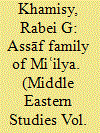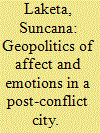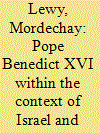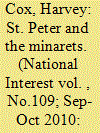|
|
|
Sort Order |
|
|
|
Items / Page
|
|
|
|
|
|
|
| Srl | Item |
| 1 |
ID:
162523


|
|
|
|
|
| Summary/Abstract |
This article sheds light on the Melkite Catholics in Galilee. It strengthens the assumption that many Melkite Catholics arrived in the Acre region during Ḍāhir al-ʿUmar's reign (1730s–1775), and it shows that relations between the Christians and adherents of other faiths were good enough in day-to-day life, allowing the Christians to develop their business and to share important properties with Muslims. It also shows that some familial traditions have been preserved since the eighteenth and nineteenth centuries; the branch of the ʿAssāf family discussed here preserved the tradition of higher education and business. This study proves that in the village of Miʿilyā, and probably in other Christian villages, there is a relationship between the arrival date of the families, the location of their quarters in the villages and the feasts that they are responsible for. In Miʿilyā, the earlier families settled the castle and were responsible for the most important feast days.
|
|
|
|
|
|
|
|
|
|
|
|
|
|
|
|
| 2 |
ID:
101172


|
|
|
|
|
| Publication |
2010.
|
| Summary/Abstract |
This article tests the theory of advocates who celebrate the potential of civil society to promote and deepen democracy in Africa, by examining whether the human rights ministry of a Catholic parish in Kibera slum in Nairobi, Kenya was able to consolidate democracy through a civic education programme during 2002-5. It concludes, from an analysis of the social, economic and political environment in Kibera, that parishioners who participated in the programme demonstrated an observable improvement in their democratic values and behaviour at a localised level within their own parish groups. However, civic education did not stimulate most participants to increase their involvement in advocacy and lobbying efforts to hold government officials to account for their abuse of power in Kibera. Parishioners were inhibited from promoting their rights primarily due to fears of violent retaliation by local government officials and politically sponsored youth wingers. Other factors such as apathy, ethnic divisions, limited resources and restrictive church protocols further curtailed parishioners' actions.
|
|
|
|
|
|
|
|
|
|
|
|
|
|
|
|
| 3 |
ID:
139040


|
|
|
|
|
| Summary/Abstract |
The Roman Catholic Church and other religious actors are confronting the nuclear issue with renewed vigor, condemning the nuclear status quo and pressing for more-dramatic steps toward disarmament.
|
|
|
|
|
|
|
|
|
|
|
|
|
|
|
|
| 4 |
ID:
147291


|
|
|
|
|
| Summary/Abstract |
This paper aims to advance our knowledge of the relationships between emotions, affect, and geopolitics. For, among several criticisms of affect’s non-representational theories, is the claim that it has not been used to understand problems of real social and political importance. What is crucially lacking in this important body of work on the nexus between affect and politics is empirically grounded research that examines these processes, especially in situations of geopolitical instability and conflict. In this paper, I seek to address this gap by attending to the geopolitical role of feelings in the volatile political climate of a post-conflict city. Specifically, my work examines the emotional and affective landscapes of daily life in the city of Mostar in Bosnia and Herzegovina which, twenty years after the war officially ended, continues to experience divisions between its Croat/Catholic and Bosniak/Muslim populations.
|
|
|
|
|
|
|
|
|
|
|
|
|
|
|
|
| 5 |
ID:
100684


|
|
|
|
|
| Publication |
2010.
|
| Summary/Abstract |
The pontificate of Benedict XVI is undoubtedly shaped by his personality as a profound thinker and one who is much more a philosopher than a politician. Management seems not to be his trade. With his intellectual mind he shuns anything that smells of populism. The mass media has an inherent difficulty in placing him within their traditional parameters. The paradigm of Pope Benedict can serve as a microcosm that reflects the complexity imprinted on relations between Israel and the Holy See. Any effort to simplify those relations according to the vocabulary of conventional bilateral relations may do injustice to their essence.
|
|
|
|
|
|
|
|
|
|
|
|
|
|
|
|
| 6 |
ID:
086880


|
|
|
|
|
| Publication |
2009.
|
| Summary/Abstract |
If there is one man alive who has made me ashamed as a Catholic and an Englishman, it is Bishop Richard Williamson. This is the man who declared on Swedish television: "There was not one Jew killed by the gas chambers. It was all lies, lies, lies." With his calumnies against the Jewish people, amplified by the Internet, he has reopened old wounds that had begun to heal and, in the eyes of many, has associated the Catholic Church with the vilest of all lies: Holocaust denial. How could so preposterous a personage come to obscure and temporarily even to overshadow nearly half a century of Catholic-Jewish reconciliation? Williamson belongs to the reactionary sect that calls itself the Society of Saint Pius X (SSPX). Its 400,000 members are better known as the Lefebvrists after their founder, the French Archbishop Marcel Lefebvre, who broke with the Catholic Church over the reforms of the Second Vatican Council (1962-65). The Lefebvrists are often described as "traditionalist Catholics," because they refuse to accept the vernacular Mass, which has been the ordinary form of Catholic worship since 1962, and insist on the older Latin liturgy known as the Tridentine Mass.
|
|
|
|
|
|
|
|
|
|
|
|
|
|
|
|
| 7 |
ID:
084380


|
|
|
|
|
| Publication |
2008.
|
| Summary/Abstract |
The timing of the rise of and spatial variation in popular support for Jurassian nationalism cannot be explained by existing theories of nationalism or proposed explanations of the Jurassian case. The article argues that support for Jurassian nationalism has its roots in Catholic political traditions of antagonism toward Berne and develops an explanation grounded in a theory of discursive change. The timing of Jurassian nationalism can be explained by the decline of the salience of the religious axis of conflict in Jurassian politics, and the variation in support for nationalism can be explained by the existence within Catholic communities of discursive content that, upon the decline of religious conflict, was susceptible to reinterpretation within a nationalist frame.
|
|
|
|
|
|
|
|
|
|
|
|
|
|
|
|
| 8 |
ID:
097834


|
|
|
|
|
| Publication |
2010.
|
| Summary/Abstract |
URBI ET Orbi ("for the city and for the world") is the traditional blessing the pope offers on special occasions. Although he has at times pronounced it in other venues-St. John Lateran, the pope's official ecclesiastical seat, or the Quirinale, now the Italian president's residence-the pontiff usually intones the prayer from the balcony overlooking St. Peter's Square. The ancient ceremony reminds us that the pope holds office as head of the Church because he has been elected bishop of "the city," Rome; that he is the leader of a global organization whose very name, "Catholic," means universal (making the whole world his parish); and that he is the head of a miniscule but internationally recognized sovereign state.
|
|
|
|
|
|
|
|
|
|
|
|
|
|
|
|
| 9 |
ID:
142526


|
|
|
|
|
| Summary/Abstract |
This article aims to consider the factors which led to a serious under-representation of Catholics within the Ulster Defence Regiment (UDR) during the Northern Ireland “Troubles.” A considerable number of UDR members were implicated in collusion with loyalist paramilitaries in their targeting of Catholic civilians throughout the conflict. Further, neither the British political nor military establishment made any significant moves towards addressing Catholic grievances regarding the UDR during the crucially formative years of 1970–1972. Despite this, Catholic under-representation has often been discussed with sole or particular reference to Republican paramilitary targeting of Catholic members of the force; this is in order to dissuade any further such involvement on the part of this demographic. The validity of such assertions will be examined in this article, along with a number of other factors which have been hitherto largely underplayed or outright ignored as contributing to this under-representation.
|
|
|
|
|
|
|
|
|
|
|
|
|
|
|
|
|
|
|
|
|